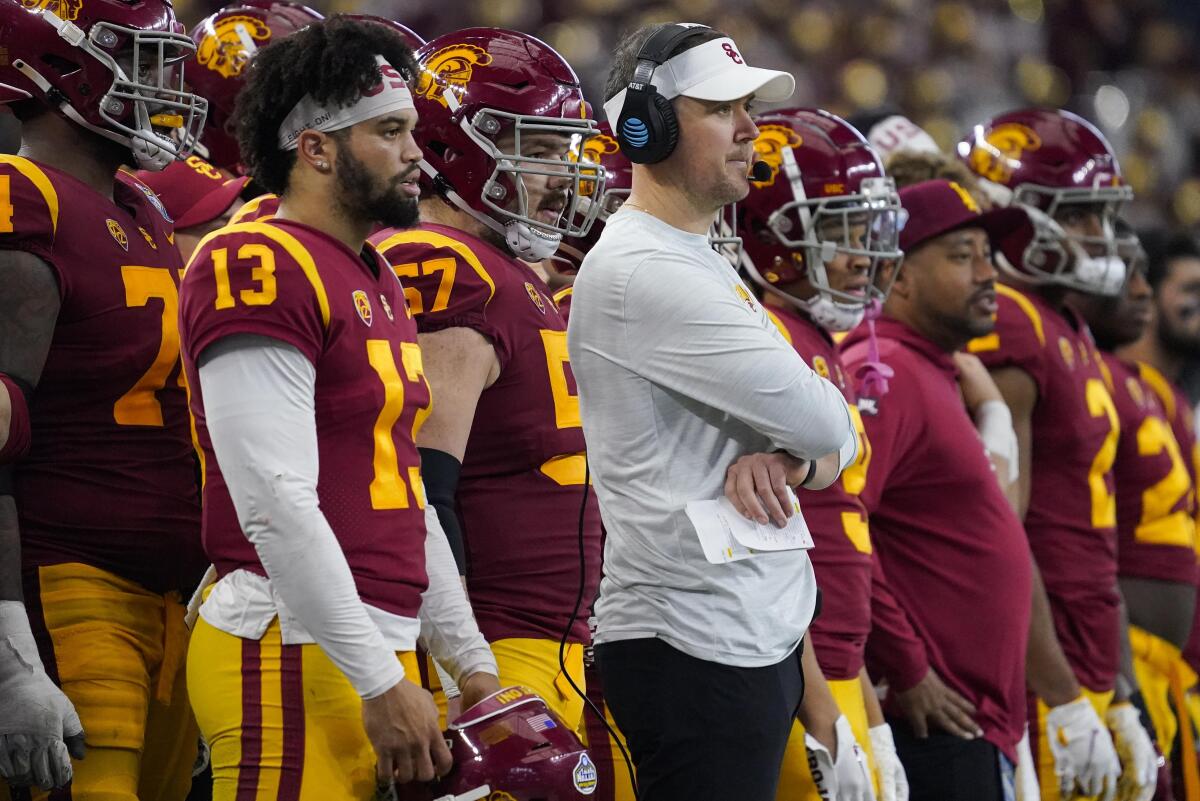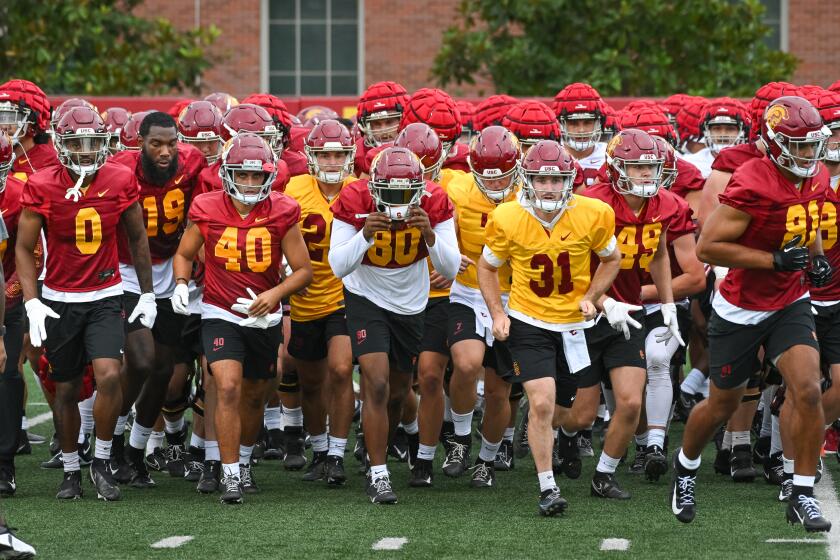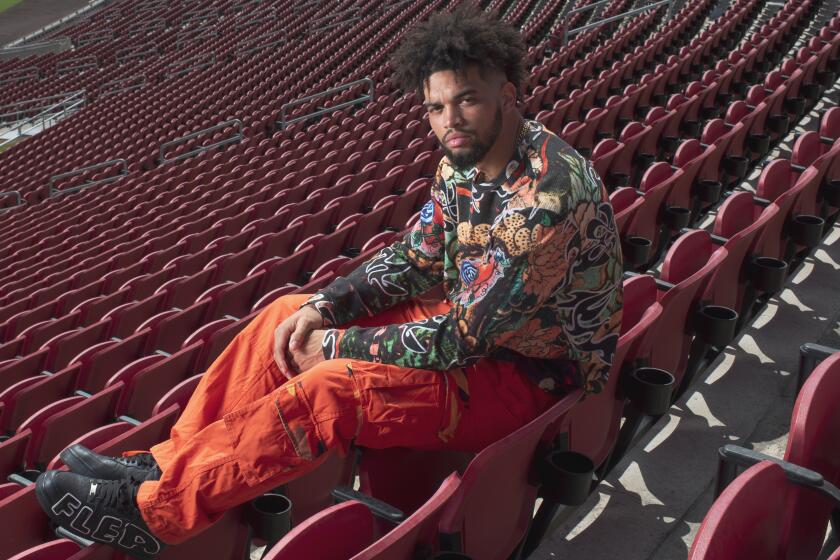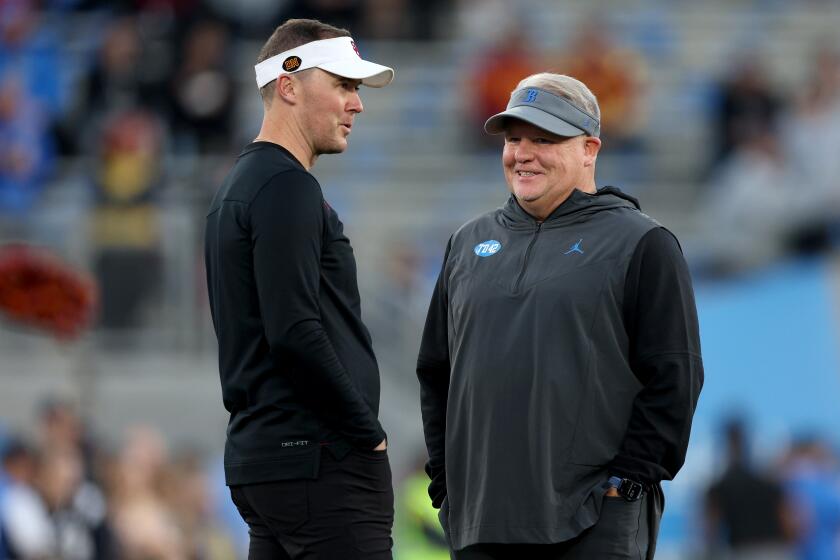Third-party collective Tommy Group launches to facilitate NIL deals for USC athletes

- Share via
A new collective has emerged at USC intent on taking the reins of facilitating name, image and likeness deals for Trojan athletes at a university that not long ago viewed the rise of such a third-party group as an existential threat.
That once-contentious approach appears to have shifted with the launch of The Tommy Group, a donor-run collective led by six entrepreneurs with deep ties to USC.
Former Trojan football players Keyshawn Johnson, Alex Holmes and John Terzian, along with prominent businessmen and USC fans David Stromberg, Avi Chesed and Mike Hahn, have teamed up to launch the group, which they say will “bring large-brand opportunities to the table” to strike NIL deals for USC athletes.
“We’re focused on maximizing our relationships and our access to nationally known, large brands,” said Holmes, a former Trojan tight end.
“We’re doing exactly what NIL was intended to do,” added Terzian, a former USC walk-on and co-founder of The h.wood Group, a major hospitality and lifestyle marketing firm in Los Angeles.
USC athletic department leaders have opposed the creation of ‘Student Body Right,’ an NIL group created by deep-pocketed donors and diehard fans.
They’ve so far been met with a much warmer welcome than their predecessors, who struck a different tone with USC at the time of their launch last August.
When a group of deep-pocketed donors started Student Body Right with similar intentions last fall, the university made its concerns about third-party collectives abundantly clear. It had no plans to support any group operating outside the auspices of the university, out of fear of future NCAA scrutiny. Student Body Right’s stated goal of paying football players “the equivalent of a base salary” only made university officials more uneasy, even as the group vowed to steer clear of the recruiting trail, where inducement by way of NIL is expressly against the rules.
Any internal concerns about the influence of a collective at USC have softened considerably since.
“We all have great relationships with them,” Terzian said. “We’ve all been big supporters over the years. I think they — and any school — just want good groups that are together that are doing this.”
Upon its launch Wednesday, founders of The Tommy Group wouldn’t offer many concrete details of how the collective plans to operate. But Holmes said that the group was “in lockstep with the [USC] compliance department” and wouldn’t have any contact with recruits prior to their enrollment at USC, which would break NCAA rules.
“That’s the paramount thing for us, operating completely within the lines, no gray area,” Holmes said. “We won’t talk to anyone until they’re signed at USC.”
But already, ahead of its launch, the group appears to have a major foothold among USC athletes. As of Wednesday, the group said it has worked with 80 athletes, including USC quarterback and Heisman Trophy winner Caleb Williams.
Caleb Williams and his father share the strategies they have used to put the USC quarterback in the best position to win on and off the field.
“I look forward to seeing all the different ways they can provide support for not only my team but other athletes in this new NIL era of college sports,” Williams said in a statement.
Williams is among several USC athletes expected to appear at a launch event for Tommy Group on Wednesday night, another sign that the arrangement with USC is starting on a more cooperative note.
The Tommy Group’s arrival also raises questions about the future of BLVD, the NIL operation which was launched last summer in conjunction with USC in hopes of staving off the rise of an outside, donor-run collective.
When Student Body Right challenged that status quo last August, USC athletic director Mike Bohn initially refused to acknowledge its existence. He released a statement at the time asking donors to “please work with BLVD so that all activities are conducted in compliance with state laws and NCAA rules.”
Questions about BLVD’s status have loomed ever since. Within BLVD, the expectation is that it will continue to exist as a separate entity, alongside Tommy Group; though, the previously hyper-present NIL operation has faded from view in recent months. An official with BLVD downplayed the notion that the two groups would have to be competitive.
Johnson echoed that sentiment when asked about other collectives in the space: “Quite frankly, we don’t care,” he said.
USC and UCLA aren’t ranked among the nation’s top football recruiting classes, but they’ve added key talent from high schools and the transfer portal.
“The reason we don’t care is we’re going to do what we have to do, and what we need to do, and what we want to do and how we want to do it, and that’s what makes us different,” Johnson continued. “We’re not trying to find out who’s involved and what other groups. We’re not in a competition, so to speak. What happens in this space is a lot of people get misinformation that’s put out there in the universe, and they think you have to be in competition.”
It’s not unusual for a major university to have multiple NIL collectives facilitating deals in the same marketplace. Florida and Texas each have three. But often expansion in that space has sparked confusion and communication issues, which then inevitably led to consolidation.
How that marketplace might look at USC by next football season remains to be seen. With the university softening its stance on third-party collectives, other groups have also had discussions about potentially entering the mix.
But with the launch of the Tommy Group, another major player in NIL has established a foothold at USC — this time, with a much less hostile hello.
More to Read
Go beyond the scoreboard
Get the latest on L.A.'s teams in the daily Sports Report newsletter.
You may occasionally receive promotional content from the Los Angeles Times.










